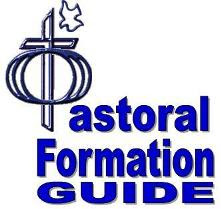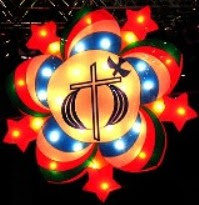MARY—WHO IS SHE IN GOD'S PLAN?
"When the designated time had come, God sent forth His Son born of a woman." —Galatians 4:4
Catholics and the Orthodox maintain Mary is the most important human being in God's plan, except for her Son, the God-Man, Jesus. Others think that by honoring Mary we take away from the worship of Jesus. However, Catholics and the Orthodox say Mary will lead a person to Jesus, just as all good Christians try to lead their friends to the Lord. After all, Mary's last recorded words in the Bible were: "Do whatever He (Jesus) tells you" (Jn 2:5). What is Mary's part in God's plan? Does she mother, minister, and intercede today?
MOTHER'S DAY
"The angel answered her: 'The Holy Spirit will come upon you and the power of the Most High will overshadow you; hence, the holy Offspring to be born will be called Son of God.' " —Luke 1:35
the teachings about Mary depend on two Biblical revelations about her motherhood. Mary is God's mother as she is the mother of Jesus Who is God (Lk 1:32, 35). She is also our Mother by adoption because Jesus told her to take John and the disciples of all time as her children (Jn 19:26).
Mary is not just the average person; she is God's mother, having conceived Jesus by the overshadowing of the Holy Spirit. If we understand God's holiness and the intimacy of the Holy Spirit with Mary in conceiving Jesus, we see that Jesus' incarnation presupposes that Mary was immaculate from the beginning of her life. Because Mary was free from sin, she was free from the wages of sin, that is, death (Rm 6:23). Thus her immaculate conception implies her assumption into heaven. This does not take away from the glory of her Son or imply she did not need to be redeemed (see Lk 1:47). In fact, it is an even greater victory for Jesus. Pope Pius XII taught: "Wherefore, the infinite dignity of Jesus Christ and His office of universal redemption is not diminished or lowered by this tenet of doctrine, rather it is greatly increased" (On the Immaculate Conception, p. 5). In the Bible, Mary is called "full of grace" and "blessed among women" (Lk 1:28, 42, 45). We have begun to appreciate how blessed and graced she was and why "all ages to come" shall call her blessed (Lk 1:48).
Because of Jesus' resurrection victory over death, her mothering is not stopped by her passing from this life to heaven. Mary's "unique," "preeminent," "singular," and yet very human place in God's plan of salvation is not only for two thousand years ago but for today (Vatican II, The Church, 53). While Jesus was hanging on the cross He told mother Mary to adopt John and the disciples of all time as her children. Mary obeyed her Son and she mothers us until the present day. Now we must obey Him by accepting and honoring her as our mother, thereby obeying the fourth commandment (Ex 20:12). This commandment carries with it the promise that it will go well with us and we will have a long life (Eph 6:3). This applies both to our natural parents and our adoptive mother. By honoring mother Mary we claim God's precious promises.
DON'T DESPISE PROPHECIES (1 Thes 5:20)
"Seek eagerly after love. Set your hearts on spiritual gifts—above all, the gift of prophecy." —1 Corinthians 14:1
We know Mary is still mothering us by what the Spirit has taught us concerning John 19:25-27 and also by the Spirit's gift of prophecy. For example, when Isaiah prophesied: "The virgin shall be with Child, and bear a Son, and shall name Him Immanuel" (Is 7:14), probably no one understood this to mean that a virgin would conceive without sexual relations. But the Spirit later revealed this through Matthew: "He (Joseph) had no relations with her at any time before she bore a Son, Whom he named Jesus" (Mt 1:23, 25). The Spirit has taken other Bible passages and given them a prophetic meaning concerning Mary (e.g. Gn 3:15; Rv 12:1). These prophecies have been tested by Christian communities across the world for centuries (see 1 Jn 4:1) and therefore are among the most confirmed and tested prophecies in the history of Christianity. They help us further appreciate Mary's special mothering role in God's plan of salvation. Micah prophesied, "Therefore the Lord will give them up, until the time when she who is to give birth has borne" (Mi 5:2).
MOTHER OF THE CHURCH
"Simeon blessed them and said to Mary His mother: 'This Child is destined to be the Downfall and the Rise of many in Israel, a Sign that will be opposed—and you yourself shall be pierced with a sword—so that the thoughts of many hearts may be laid bare.' " —Luke 2:34-35
As the Spirit overshadows our understanding by teaching us His word and pouring out the gift of prophecy, we become more aware of how Mary continues to mother the church. The titles of Mary are usually prophetic statements about aspects of her mothering. As Sorrowful Mother, she has the gift to lay bare the thoughts of many hearts. As Our Lady Of Perpetual Help, she exercises a powerful intercessory ministry (Jn 2:3). As Spouse of the Spirit, she prays for a new Pentecost, as she prayed at the first outpouring of the Spirit (Acts 1:14). As Our Lady Of Lourdes, she heals her children. As Our Lady Of Guadalupe, she evangelizes and ministers to the poor. As Our Lady of Fatima, she asks us to accept Jesus' call to be peacemakers (Mt 5:9). All these ministries are aspects of motherhood. Mothers are primarily concerned about peace among the children in their family. Mothers live to lead their children to Christ. They intercede for, heal, and serve their children. They often minister the Spirit to their children. That same Spirit that Mary prayed for at the first Pentecost now teaches us to appreciate her mothering and to honor her as mother.
MARY'S MOTHERING IN MY LIFE
"Together they devoted themselves to constant prayer. There were some women in their company, and Mary the mother of Jesus." —Acts 1:14
As a youngster I came to know Mary as my mother. We prayed the family rosary each evening, and this prayer-time bore fruit in an exceptional family life. I stayed in touch with Mary throughout high school and college but almost forgot about her in graduate school. I no longer prayed the rosary daily, for I had become too sophisticated for such a simple prayer. My life was deteriorating gradually. My estrangement from Mary was symptomatic of a breakdown of my relationship with Jesus; I still went to church and prayed but had lost my first love (see Rv 2:4). I was compromised with the world and no longer loved Jesus with all my heart and soul (Mt 22:37). I was experiencing meaninglessness and powerlessness in my life. In l975, one year after my ordination to the priesthood and one week before Pentecost, after reading Acts 1:14 as I was preparing for the Sunday homily, I decided to gather some people to pray for the Spirit. The Spirit came in a torrential outpouring, and almost immediately the Spirit restored my relationship with Mary and my daily praying of the rosary. The first time I prayed in tongues was during the rosary. One of the most effective evangelistic outreaches I have ever witnessed was the result of a rosary procession. Also, the only time I have seen the Spirit renew a parish extensively was through the intercession of Our Lady of The Presentation.
MARY'S IMMACULATE HEART AND JESUS' SECOND COMING
"In turn He said to the disciple, 'There is your mother.' From that hour onward, the disciple took her into his care." —John 19:27
The Spirit is using Mary now to prepare the way for her Son's final coming. In 1917 at Fatima, Portugal, Mary prophesied that Russia could be converted and her immaculate heart would triumph. We hear of revival in Eastern Europe, Russia, and China. These events seem to be preparing for the miraculous fulfillment of the Fatima prophecies and a worldwide evangelistic explosion.
As the Lord's plan of salvation unfolds and culminates, the Lord seems to have commissioned Mary to prepare us for His second coming. Therefore, He asks us to dedicate ourselves to Mary's immaculate heart. The revelation of Mary's immaculate heart is one of the most confirmed prophecies of all time. Our dedication to her immaculate heart is a commitment to lay bare our hearts (Lk 2:35) and receive new hearts that are holy, immaculate, and pleasing to the Lord. It means that we accept Mary's mothering and agree to cooperate with her as she ministers the Holy Spirit to us, as she did with Elizabeth and John the Baptist (Lk 1:41). Great athletes or musicians dedicate themselves through strict obedience and extensive work to a professional coach or virtuoso. Likewise, to be holy we need to be discipled by others, especially our mother Mary. Wearing the scapular is a sign that we have decided to cooperate fully with Mary as she makes us disciples of her Son Jesus.
In conclusion, speak to Mary from your heart:
"Mother Mary, thank you for loving Jesus and being my mother. I dedicate myself to your immaculate heart. I ask you to pray for, teach, command, correct, and guide me. I commit myself to cooperate with and obey you so I will grow to love Jesus with all my heart and stand holy before Him when He comes a second time."
Nihil obstat: Reverend Ralph J. Lawrence, July 14, 1998.
Imprimatur: Most Reverend Carl K. Moeddel, Vicar General and Auxiliary Bishop of the Archdiocese of Cincinnati, July 20, 1998.
The Nihil obstat and Imprimatur are a declaration that a book or pamphlet is considered to be free from doctrinal or moral error. It is not implied that those who have granted the Nihil obstatImprimatur agree with the contents, opinions, or statements expressed. and

























